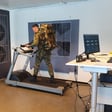Become a Creator today!Start creating today - Share your story with the world!
Start for free
00:00:00
00:00:01

Cindy - Sign Language Interpreter
Sign language is something most of us have heard about, but most of us don't really know what it's like. Well, this interview with Cindy is a phenomenal deep dive from someone who has made a very successful career out of sign language interpreting. If you have interest in this career, or just want to hear a fascinating interview and learn something new, you absolutely cannot miss this episode! Thank you, Cindy!
If you need to reach Cindy for her services, you can find her HERE *
If you enjoyed this interview and would like to support the show, you can do so HERE. Thanks!
*The Jobs Podcast is not affiliated with ASLMO.com or their affiliates.
Recommended
Transcript
00:00:01
The Jobs Podcast
Hey folks, you're listening to the jobs podcast. I am your host, Tim Hendricks. Today we have a very unique guest in a pretty incredible occupation. We have Cindy with us today. Cindy owns or is a co-owner of a sign language company, and she is going to talk about her career as an interpreter. So welcome, Cindy.
00:00:21
Cindy Lear
Well, thank you so much for having me, Tim.
00:00:23
The Jobs Podcast
So let's start off like we always do. Give us a little snapshot about your childhood, your upbringing, and your early influences and education. We'll just kind of go from there.
00:00:33
Cindy Lear
Sure. I was born in a small town outside of Wichita, Kansas, in a little town called Newton, Kansas. My father was going to med school at the time.
00:00:47
Cindy Lear
and um later, as he went through his varieties of training to become a plastic surgeon. We lived in different areas in mostly Kansas until we ended up moving to Springfield, Missouri. And I graduated from Glendale High School in Springfield in 1975.
00:01:10
Cindy Lear
I went on to get a bachelor's degree in psychology from William Woods in Fulton. And while I was in classes at William Woods, I happened to meet a professor there who was deaf.
00:01:27
Cindy Lear
I decided to take a sign language class. I had deaf people in my family growing up. um And so It was just how, you know, communicating with deaf people was normal for me. And I didn't understand, I guess, that it was a language.
00:01:46
Cindy Lear
I just thought, oh, this is the way you get your needs met.
00:01:49
The Jobs Podcast
Okay?
00:01:49
Cindy Lear
You know, you, if you want milk, if you want candy, if you want to play. um And then that's how I sort of knew sign language. When I met um the professor who was a a deaf man,
00:02:06
Cindy Lear
I walked into my first class and I said, hello, um my name is Cindy and I'm going to take your class. And he said, you know how to sign? and I said, oh, yeah, I had deaf people in my family.
00:02:22
Cindy Lear
And so that's how my career deafness started.
00:02:28
The Jobs Podcast
did you Did you learn just a lot of the basics when you were dealing with your family members? You had a, I guess, maybe a conversational, if if I can apply it to learning, say, Spanish.
00:02:39
The Jobs Podcast
You have a ah conversational ability, but then um you weren't, I guess, as good as like a native speaker would be in another language.
00:02:46
Cindy Lear
Right. So it wasn't, it was my parents. It was the, it was my grandparents and aunt.
00:02:51
The Jobs Podcast
Oh.
00:02:52
Cindy Lear
um And so um it was just like, since I was born and into this family, it was just like communicating like you do as a hearing child.
00:03:02
The Jobs Podcast
huh
00:03:03
Cindy Lear
um and You know, they're signing, they're using ah language, sign language. And so i I learned sign language just, I suppose it was more home signs because there were signs that weren't really um American sign language signs. They were apparently developed in my family only.
00:03:24
The Jobs Podcast
oh
00:03:25
Cindy Lear
Um, and so that's how I was exposed to it, but I didn't really recognize it, that it was a language, an entirely different language.
00:03:39
Cindy Lear
Um, as I think that was kind of an interesting experience. I didn't have a lot of exposure in my, um, in my high school years because we'd moved away from Kansas where my family was, my aunt passed away.
00:03:52
Cindy Lear
so um that that kind of informed how I was raised. But then later, i i didn't ever really think about it as I was in college or you know in high school.
00:04:04
The Jobs Podcast
It was just something you were raised with.
00:04:05
Cindy Lear
Right, exactly.
00:04:06
The Jobs Podcast
Yeah. So this class that you walk into and your instructor noticed that you speak sign language, was that kind of like the the launching pad for your career or how did it proceed from there?
00:04:18
Cindy Lear
it It was. So I was getting i took two sign language classes my last year, and then I did some work at the Kansas School for the Deaf. I mean, the Missouri School for the Deaf, which was in Fulton, Missouri.
00:04:32
Cindy Lear
And I spent a lot of time with my mentor. My it his name was Stephen Kosiar. And um he suggested that I go on and get a master's degree.
00:04:46
Cindy Lear
When you graduate with a degree in psychology, ah bachelor's degree in psychology, it's kind of laughable in some ways because there really isn't anything specific that you go on to do with this degree.
00:05:00
The Jobs Podcast
Oh.
00:05:01
Cindy Lear
um There aren't automatic jobs. you know You have a bachelor's degree, but that's about it. So um Mr. Koziar encouraged me to look at master's degree training programs in different parts of the country that would be in counseling with deaf people.
00:05:23
The Jobs Podcast
oh
00:05:23
Cindy Lear
The government was funding those in the late 70s, early 80s, and were encouraging people to work with people with disabilities. So I applied to one of those programs, I was accepted, and I moved to Oregon in order to get my master's degree.
00:05:45
The Jobs Podcast
The I've got some basic questions about the structure of sign language.
00:05:50
Cindy Lear
Sure.
00:05:51
The Jobs Podcast
So pretend that I don't know anything. It's pretty easy because I don't know anything about sign language. But um is this is this when you're signing, are you signing um words or are that letters or is it what's the sentence structure like or how's the how would you if you were to explain to someone like in a conversational English where I just made a sentence?
00:06:14
The Jobs Podcast
How does that come across when you're signing with someone? Is it a general idea that you're conveying or is it, are you going to school? I mean, does it break it down by word like that or how does it lay out?
00:06:28
Cindy Lear
So the way that the the language is American Sign Language, and it has an entirely different grammatical structure from English, there are um words in sign language like table, bed, dog, cat, that are signs that are specific.
00:06:36
The Jobs Podcast
Okay.
00:06:49
Cindy Lear
but um But my name, there is no sign for Cindy, for example. So I would have to fingerspell my name, C-I-N-D-Y.
00:06:55
The Jobs Podcast
Oh.
00:07:01
Cindy Lear
um the The grammatical structure is one that is visual and then conveyed in a visual form using your hands.
00:07:13
The Jobs Podcast
okay
00:07:13
Cindy Lear
So you're making use of your entire 3D space in front of you and you're setting up visually a picture for the deaf person using the combination of signs.
00:07:31
Cindy Lear
um We have what are called classifiers, which are ways of um our hand shapes that are used to denote sizes and shapes of items.
00:07:47
Cindy Lear
um So its it's very, very complicated. It's not word for word by any means.
00:07:54
The Jobs Podcast
Okay.
00:07:55
Cindy Lear
Right.
00:07:56
The Jobs Podcast
And you're you're mixing in ideas and gestures with spelling such as your name.
00:08:02
Cindy Lear
right
00:08:03
The Jobs Podcast
So you're jumping back and forth to different methods of communication all at once.
00:08:07
Cindy Lear
Correct. Correct. And you're you're doing that in your in your brain as an interpreter. You're taking this language that you're hearing, the English language, and you're putting that into your brain and you're creating a picture in your brain.
00:08:25
Cindy Lear
And then you're conveying that picture in your brain on your hands.
00:08:31
The Jobs Podcast
Are you, after you do a day or, you know, a morning, or I don't know how your day works, you have to be just kind of mentally spent.
00:08:40
Cindy Lear
Oh my gosh, you it's exhausting.
00:08:44
The Jobs Podcast
Yeah.
00:08:44
Cindy Lear
um Particularly when you are um conveying areas that you don't really know anything about. So like, I don't know anything about carpentry, but I go to interpret for a guy who's taking um an advanced course and um and woodworking.
00:09:06
Cindy Lear
And so I have to find, we have to find ways of delivering that real technical information into ah way that he's going to understand it.
00:09:18
Cindy Lear
So sometimes we're creating signs that we're, that we both understand, um, that are, you know, that mean a plank, that mean a nail, that mean, you know, all these different ideas, um, and then very, you know, very specific technical ideas.
00:09:30
The Jobs Podcast
Sure.
00:09:36
Cindy Lear
Um,
00:09:36
The Jobs Podcast
that brings up a question that I usually like to see if there are areas of specialization with someone's skill set. Do you have folks in your line of work that will typically only do technology or that will do medicine or that will do education or whatever? So you're not having to learn things on the fly, but you can really dial in what you're trying to convey?
00:10:01
Cindy Lear
That is a really good question. um And I'm gonna backtrack just a little bit and tell you that there are levels of certification for sign language interpreters.
00:10:06
The Jobs Podcast
Yeah.
00:10:13
Cindy Lear
um An interpreter has to have um ah bachelor's degree in something, and then they also have to have a level of fluency in sign language.
00:10:23
The Jobs Podcast
okay
00:10:24
Cindy Lear
So both of those things have to exist. And with learning sign language, people have a real variety of levels of what they can do. Somebody goes to a program for a couple of years, they come out, and they're newbie in in our in our line of work.
00:10:46
Cindy Lear
And um they maybe don't have the breadth of knowledge or the breadth of interaction with ah a wide variety of deaf people to be able to get a lot of the experience they need.
00:10:58
Cindy Lear
So they go take a test and there's levels one through five. um Levels 1 and 2 are really baby interpreters that can't really do much and there are ah guidelines about what they can and can't do for all the levels.
00:11:17
Cindy Lear
So levels Level 3 is an interpreter who can interpret in the education field. A Level 4 interpreter can communicate in um a medical setting plus everything else.
00:11:33
Cindy Lear
And a Level 5 can do legal work. So the highest certification is a comprehensive Level 5 person.
00:11:43
Cindy Lear
And those are rare, hard to come by.
00:11:43
The Jobs Podcast
hey
00:11:47
Cindy Lear
um We only hire in our agency the levels three, four, and five. um And again, you know, they have specific things they can do. Many of the level fives will focus a lot of their training in the legal arena, which involves a lot of legal language.
00:12:10
Cindy Lear
um level fours may focus on medical aspects of interpreting and they can do, you know, everything.
00:12:20
Cindy Lear
But once you have a pretty good medical background and being able to describe how the body works and diseases and things like that, they also, you know, can do education.
00:12:33
Cindy Lear
They just can't the legal interpreting.
00:12:37
The Jobs Podcast
That's its own.
00:12:38
Cindy Lear
Yes.
00:12:38
The Jobs Podcast
I mean, that's that's I can see that being ah just full of pitfalls and and issues, but.
00:12:43
Cindy Lear
Right. Well, and it's, it is something that you have to absolutely get right. Um,
00:12:50
The Jobs Podcast
Yeah.
00:12:50
Cindy Lear
um Because people are are, this is their lives. They're pleading guilty. They're pleading not guilty.
00:12:57
The Jobs Podcast
Sure.
00:12:57
Cindy Lear
They're, you know, in a court setting that has its own specific ways of doing things. And so you could see why that's, you know, really ah highly skilled part of our profession.
00:13:07
The Jobs Podcast
Mm hmm.
00:13:10
Cindy Lear
Medical, too, is ah is a very highly skilled function. um
00:13:16
The Jobs Podcast
You don't have much leeway to get things wrong in either one of those arenas.
00:13:19
Cindy Lear
No, no, you don't.
00:13:20
The Jobs Podcast
Yeah.
00:13:20
Cindy Lear
And, um you know, i was I was reminded that I went and I interpreted for a person who had mental illness and they were in an emergency room and they were explaining while they why they were there.
00:13:37
Cindy Lear
but But at the same time, they weren't fully functional. um and The doctor said, you need to take x Y, and z medicine. and the And one of the medicines was over the counter.
00:13:53
Cindy Lear
And so they didn't ah understand what over the counter meant.
00:13:56
The Jobs Podcast
Ah. Hmm.
00:13:57
Cindy Lear
So I had to explain, you know, you go to Walmart and there's the aisles and you see there's a label that says medicine for um stomach problems.
00:14:10
Cindy Lear
And you're going to look there and it might be an orange bottle. um But again, that's me understanding or having an idea that the person couldn't understand what the doctor was trying to convey.
00:14:28
Cindy Lear
ah So I had to break it down into really small chunks so that they could understand exactly what they needed to buy and how much they needed to take.
00:14:38
The Jobs Podcast
The stages that you were mentioning just a little bit ago about the, the one, two, three, four, five, is there, i mean, ah is there a certain timeframe where steps one and two will usually take you six or 12 months and then step three takes a year or how does that typically break down or is it kind of at your own pace as you feel led to move on?
00:14:44
Cindy Lear
Yeah.
00:14:55
Cindy Lear
Yeah.
00:14:59
Cindy Lear
So deaf people, so hearing people learn how to become interpreters by either going to a college program that has a bachelor's degree or maybe even an associate's degree in interpreting.
00:15:15
Cindy Lear
So William Woods happens to have a bachelor's degree in interpreting program. So somebody is gonna go to that program and take four years of language. They're gonna also learn how to be a sign language interpreter.
00:15:29
Cindy Lear
um Johnson County Community College has a two-year program that gives you an associate's degree and then you have to go on and get your bachelor's degree. So the certification part of the process is that you have to um take um a sign language test that where you are watching a deaf person and you are interpreting what they are saying, you're putting that into English and you are listening to the hearing person and putting that into sign language.
00:16:01
Cindy Lear
And you are judged based on how well you did on that interpreting test and that is your certification level. And so a person will take that certification test when they feel like they have the skill to be able to pass that test successfully.
00:16:26
Cindy Lear
um So they will get a rating um based on how they you know how they did and in that test.
00:16:27
The Jobs Podcast
I just.
00:16:33
The Jobs Podcast
Okay.
00:16:35
Cindy Lear
So they will get and one, two, three, four, five, for example. um And it's a very, very difficult test to take. And so people can take it multiple times. And as they get you know better and better and better, they they will advance in their license, in their certification level.
00:17:00
The Jobs Podcast
I just thought of a question just kind of out of left field, but is there slang and sign language like we have in the the English language? I'm in the United States.
00:17:10
The Jobs Podcast
And is there, are there regional differences? You know, like in the South, they've got the way they say things and do things, and then you've got the East Coast.
00:17:17
Cindy Lear
What a great, that is a great question. um Yes, there's, there's slang.
00:17:19
The Jobs Podcast
Yeah.
00:17:22
Cindy Lear
um There's, um of course, you know, everybody wants to know what the dirty language, when they're learning sign language, the first thing to ask is, tell me all the dirty language.
00:17:31
The Jobs Podcast
Yeah. Hmm.
00:17:34
Cindy Lear
Yeah. And so there's that. But there is there is slang and it and it does. um That's very by region in the United States by how people communicate.
00:17:45
Cindy Lear
But there isn't a single deaf person who communicates like another deaf person. um And so a lot of what an interpreter has to do is understand that person's way of communicating um and and to be able to.
00:18:04
Cindy Lear
adjust as an interpreter the way that we're communicating so that person understands us or understands the interpreter.
00:18:11
The Jobs Podcast
Do you have, is it where you show up and start communicating with someone and you realize that there's a foundational familiarity there where we have about 75 or 80% of what we're saying is, is the same, but then you're asking for clarification on certain gestures that you may not, not be familiar with.
00:18:23
Cindy Lear
Yes.
00:18:28
Cindy Lear
yeah I may not understand and I'm doing that while I'm interpreting.
00:18:30
The Jobs Podcast
Okay. Okay.
00:18:32
Cindy Lear
trying to figure that out. um In terms of different signs, like the sign for Starbucks, you know, Starbucks didn't exist 20 years ago. So it's a new sign.
00:18:41
The Jobs Podcast
Mm-hmm. Hmm.
00:18:43
Cindy Lear
And one side of the coast signs Starbucks one way and another sign, another coast signs it a different way. um And so, you know, you as an interpreter, I know those ways that Starbucks looks what it appears to be.
00:18:59
Cindy Lear
um and again, a lot of it is context. You're understanding, you know, 80, 90 percent of what the person is saying. And then a sign comes up that maybe is their regional sign.
00:19:11
Cindy Lear
And um you get it because it's in context.
00:19:15
The Jobs Podcast
Okay.
00:19:16
Cindy Lear
So um I guess it's just like, ah you know, it's just like English where you would hear a word that you don't, you've never heard before, but you understand the meaning because it's in context.
00:19:29
The Jobs Podcast
it To elaborate on the the regional thing, are there you know yeah if I hear somebody from Brooklyn, they have a unique accent.
00:19:38
Cindy Lear
Right.
00:19:39
The Jobs Podcast
I hear someone from Alabama, they have a unique accent. Can you pick up on maybe where somebody is from by their style of signing? Is there a regional style?
00:19:50
Cindy Lear
No, um I mean, when you are when you ah when you move to a region, you are become more familiar with those kinds of things, but not it's not so much of region as much as it might be ah the deaf person's age.
00:19:59
The Jobs Podcast
Okay. Oh, sure.
00:20:07
Cindy Lear
um
00:20:08
The Jobs Podcast
oh sure
00:20:08
Cindy Lear
or um the deaf person's their age and their experience. So like a little kid is going to sign differently than a senior citizen and um senior citizens for example deaf senior citizens are typically much more grateful for your for being a so for for being an interpreter and being present ah versus a young person who's grown up with interpreters their whole lives, they just kind of take it for granted.
00:20:41
The Jobs Podcast
Hmm.
00:20:41
Cindy Lear
Because you have to remember that when um deaf deaf people have come a long way in the last 25 years in terms of their accessibility and what what they can how they can interact with the world.
00:20:59
Cindy Lear
When I was growing up, my family um had no way to order a pizza, for example.
00:21:07
The Jobs Podcast
yeah
00:21:07
Cindy Lear
um because there there wasn't a um a telephone um that ah that we could use. We had an old TTY, which was a big, huge um monster of a ah telegraph kind of thing, up and you would type on it, but the ah but the other end of the phone had to have a TTY to be able to communicate.
00:21:34
Cindy Lear
And, you know, pizza places obviously wouldn't have a TTY at their business.
00:21:39
The Jobs Podcast
Apps and things nowadays would probably be rather advantageous, right?
00:21:41
Cindy Lear
Yeah.
00:21:43
Cindy Lear
And so along with time and along with technology came... video tech, the video technology to be able to have um an interpreter where you, you use a, you call your phone number, but the first, your first stop in your phone system is to, is to talk to the interpreter and then the interpreter connects to the hearing person.
00:22:08
The Jobs Podcast
Oh.
00:22:08
Cindy Lear
And so you're so a deaf person is sitting in their house, seeing an interpreter in their office, you know their their video relay office, and then they're talking to, they have a headset and they're talking to a um the hearing person.
00:22:27
Cindy Lear
So maybe they're calling and getting an appointment. And so um I, as the interpreter, would say, um this is, you know, interpreter number five calling and you your're your deaf person is on the line.
00:22:43
Cindy Lear
Go ahead and communicate.
00:22:45
The Jobs Podcast
Hmm.
00:22:46
Cindy Lear
um
00:22:47
The Jobs Podcast
When you travel overseas, do you, are you able to, is there a language barrier?
00:22:47
Cindy Lear
and
00:22:52
The Jobs Podcast
Like in, if I go to Japan, I don't speak Japanese, but if you go to Japan and speak with a deaf person, are you able to communicate? Is is sign language kind of a global thing?
00:23:03
Cindy Lear
it No, it is it is limited to countries. So the United States has American Sign Language.
00:23:08
The Jobs Podcast
Oh.
00:23:11
Cindy Lear
Mexico has Mexican Sign Language, Albanese Sign Language.
00:23:14
The Jobs Podcast
Okay.
00:23:16
Cindy Lear
Now, I am much more comfortable using gestures on my body and my and facial expression. So I am probably more likely to be able to communicate with you know, on a surface level with a Japanese Deaf person than you might be.
00:23:36
The Jobs Podcast
OK.
00:23:36
Cindy Lear
because you you know you don't know any of the characters and I don't know any of the characters that you would use to write down, but I might be more comfortable signing, eat or drink or you know pointing to my my wedding ring you know for family, husband, that kind of thing.
00:23:55
The Jobs Podcast
Oh, sure. OK.
00:23:57
Cindy Lear
So um I have met people from other countries when I've traveled. And it's it's interesting because a lot of um people do know some American Sign Language. And I think that has to do with the internet and TikTok and YouTube and um you know people watching each other from other countries.
00:24:22
Cindy Lear
um And so that's, I met some Portuguese people and day they used quite a bit of American Sign Language. um And then I met ah some Mexican ah Deaf people and um we we only had to do, we could only do gestures.
00:24:38
The Jobs Podcast
ah
00:24:39
Cindy Lear
um
00:24:40
The Jobs Podcast
where I don't know the history of sign language. I know we could probably spend a whole episode just talking on the origins, but who was the originator of sign language and where did it originate from?
00:24:52
Cindy Lear
Well, it originated, um i mean, obviously, there would have been sign language wherever there were ah group of deaf people.
00:25:02
The Jobs Podcast
Sure.
00:25:03
Cindy Lear
So they're going to, just like in my family, they're going to create signs um to be able to ah communicate with each other. um but that But sign language, we actually went over to, from America to France and brought back a lot of the of French sign language.
00:25:22
The Jobs Podcast
Oh,
00:25:23
Cindy Lear
um And so ours is infused, you know, with more of French than anything else.
00:25:29
The Jobs Podcast
okay.
00:25:30
Cindy Lear
But yeah, if that's a whole nother, that's a whole nother, that's a deep dive into how did sign language originate.
00:25:32
The Jobs Podcast
Sure. Yeah, maybe episode part two. i I'll have you back for another episode. We can just talk about the history of it.
00:25:40
Cindy Lear
Okay, there you go.
00:25:42
The Jobs Podcast
So um you talked about the TTY machine, but in your industry, you've been doing this for quite a while now.
00:25:43
Cindy Lear
Right.
00:25:48
The Jobs Podcast
You've made an entire career out of it. What are some of the big advancements or the big ticket items change-wise that you've seen in your career as far as um interacting with businesses or with ah legal entities like the courthouse or the DMV, et cetera?
00:26:07
Cindy Lear
right
00:26:10
Cindy Lear
um it It really um started back with the Americans with Disabilities Act in 1990. And that was um President Bush signed that.
00:26:29
The Jobs Podcast
OK.
00:26:30
Cindy Lear
a civil rights law that protects people with disabilities from discrimination. and that And that applies to employment, transportation, public accommodations.
00:26:44
The Jobs Podcast
okay
00:26:44
Cindy Lear
And so, you know, you can think of accommodations as ramps, elevators, grab bars, that kind of thing, but it also provides deaf people with equal access and opportunities for accommodations using sign language interpreters and in the telecommunications field.
00:27:04
Cindy Lear
So the telecommunications being that we we were able to advance technology to be able to have that video remote interpreting for people that were making, deaf people making phone calls or hearing people making phone calls to deaf people.
00:27:22
Cindy Lear
um and And the telecommunications, the video relay services are funded through the Federal Communications Commission.
00:27:35
Cindy Lear
And so are the taxes that we pay into paying our phone bill go for that service for deaf people to have access.
00:27:44
The Jobs Podcast
Oh. Hmm.
00:27:45
Cindy Lear
But before the Americans with Disabilities Act, there was absolute discrimination against deaf people. So if you wanted, if a deaf person wanted to get a job, um you know, they would just say, no, you know, I'm, um you're deaf and we can't work this out and we can't help you and you can't have a job here.
00:28:07
Cindy Lear
But after the ADA, there started to be changes and the in employment settings with telecommunications that made it possible.
00:28:18
Cindy Lear
um I had a friend or I have a friend who's a got a PhD and really bright guy. And I said, um you know, what is one area that you would like to.
00:28:33
Cindy Lear
um For yourself achieve. And he said, I would like to be a pilot. And this was back in the 90s. And I said, well, how you know how can a deaf person become a pilot?
00:28:47
Cindy Lear
because that's Because it's not just visually dependent. It's also, you know you have to be auditorily dependent.
00:28:53
The Jobs Podcast
Right.
00:28:54
Cindy Lear
And he said, you know technology will catch up and eventually deaf people will be able to be pilots. And that that always stuck with me that it is our own belief about what deaf people can and can't do.
00:29:13
Cindy Lear
And it is it is certainly technology allows deaf people to do anything they want to do. um We used to say that over the road truck drivers can't be deaf people, but deaf people actually have better um car accident rates than hearing people do because we're much more distracted um by audit to you know sounds in our car.
00:29:38
Cindy Lear
um
00:29:40
The Jobs Podcast
There's a lot of jobs out there where I've, I mean, I've had hearings since I was born. I've never had to stop. I look at my job in the fire service. We didn't encounter too many deaf folks when we were running medical calls or fire, you know, but you're usually, it's a very crude, I don't need fine communication.
00:29:55
Cindy Lear
Right.
00:30:01
The Jobs Podcast
We're moving over here now.
00:30:01
Cindy Lear
Right.
00:30:02
The Jobs Podcast
I'm, you know, and so gestures and pointing and things usually was sufficient.
00:30:03
Cindy Lear
Right.
00:30:08
Cindy Lear
Exactly.
00:30:08
The Jobs Podcast
But when you look at other jobs, it that's that seems like just a whole different mindset to where if you take a, I don't know, a pilot, for example, I've never even stopped to think, what would a pilot do? How would he do his job or her job if they don't have hearing?
00:30:28
Cindy Lear
Right.
00:30:29
The Jobs Podcast
And that's probably a whole industry of people that look at each career and say, okay, how would this be changed?
00:30:36
Cindy Lear
How could you apply the technology that we have now being able to be a pilot?
00:30:36
The Jobs Podcast
Or yes. Yes. Right.
00:30:41
Cindy Lear
It was it like I was saying with the over the road truck drivers, they used to not have deaf over the road truck drivers, but as technology has grown and changed to allow greater accessibility for deaf people, people um we our our sign language company provides education for over the road truck drivers who are coming here to Springfield
00:30:44
The Jobs Podcast
Mm-hmm.
00:31:06
Cindy Lear
getting three or four days of training to be over the road drivers, because that um level of technology is available for them to be able to do that job effectively.
00:31:21
Cindy Lear
And I think that's so cool.
00:31:24
The Jobs Podcast
what what is What changes are made for someone who is unable to hear to be able to drive a semi-truck? I can't quite even visualize what that would look like or what would be adapted.
00:31:38
Cindy Lear
Well, I don't think there's any real issues with the actual driving part of
00:31:43
The Jobs Podcast
Right, the alerting, the lighting and things.
00:31:45
Cindy Lear
Right, but it is it it is the it is the phone now that everybody uses. And um so like when when a deaf person is arriving somewhere and maybe they're getting the weight of, you know, going through the weight of their truck, they might be calling the person that's going to be doing that weight and have a conversation, but they're doing that over the phone. So it's visual for the deaf person.
00:32:12
The Jobs Podcast
Okay.
00:32:12
Cindy Lear
And um so the phone is what's the amazing part of it, and that's how the communication is is handled. There will be an app on the deaf person's phone that they are making the call to, and they get the sign language interpreter.
00:32:29
Cindy Lear
So all their information 100% clear,
00:32:31
The Jobs Podcast
Oh.
00:32:34
Cindy Lear
um As long as, you know, the weather is okay, I guess.
00:32:37
The Jobs Podcast
Yeah.
00:32:38
Cindy Lear
And they're not having any interruptions.
00:32:40
The Jobs Podcast
Sure.
00:32:41
Cindy Lear
um but But they're communicating effectively over the phone. um And so that I think is the the big piece of it, is that there's always access to spoken communication for a deaf person and and sign language.
00:32:58
Cindy Lear
24 hours a day, that service exists.
00:32:59
The Jobs Podcast
It's very...
00:33:03
The Jobs Podcast
It's sometimes easy for the knee-jerk reaction to think that technology, it's everywhere. We need to go kind of old school on some stuff. But there are certain areas where technology opens up a whole new world for people.
00:33:17
The Jobs Podcast
And it it's it just moves their lives you know years into the future as far as just their ability to work and be productive members of society and not be limited in any way.
00:33:30
The Jobs Podcast
And I can see apps and and technology being a big benefit to to your industry.
00:33:31
Cindy Lear
Exactly. when I first started, um when Rebecca and I first started our sign language interpreting agency, there was, and this would be 20 years ago, there was a lot of misinformation about the need for an interpreter, who interpreters were,
00:33:57
Cindy Lear
um how interpreters were paid. And over the course of 20 years, obviously that's changed. And now, you know, with the Americans with Disabilities Act saying, you know hospital, you have to have a sign language interpreter when you are seeing a deaf person.
00:34:12
Cindy Lear
um you know, that that has really elevated like our our service. So our service didn't ah sign language interpreting did not exist when Rebecca and I moved to Springfield, Missouri.
00:34:29
Cindy Lear
um So we were the very first company in in town.
00:34:34
The Jobs Podcast
Is most of your work done in person or over technologically, you know, remotely, or is it a good mix?
00:34:41
Cindy Lear
um Most of our work is in person in the Southwest Missouri area, um and but we do do um remote interpreting when we can't get somewhere that needs interpreting.
00:34:44
The Jobs Podcast
Okay.
00:34:57
Cindy Lear
And usually those are court cases in small towns involving a deaf person.
00:35:03
The Jobs Podcast
Hmm.
00:35:03
Cindy Lear
Um, so, or maybe even, um, like a, a police op, a police stop, or when you're not able to actually go to to the place we can, we can do remote.
00:35:18
Cindy Lear
Um, but most of it in, most of it in person.
00:35:23
The Jobs Podcast
What would you say that you like most about your career?
00:35:28
Cindy Lear
ah love making a difference and the community's life, in the lives of business people, and in the lives of deaf people.
00:35:41
Cindy Lear
Because we are connecting, we are the bridge, the connector to two different worlds.
00:35:49
The Jobs Podcast
Nobody else can do what what you do. When you walk in, you are it. I mean, you're the, like in a ah court case, for example, you're it.
00:35:58
Cindy Lear
Yes.
00:35:58
The Jobs Podcast
And that's gotta be exciting and also very gratifying to know that you' you're the only person here that can, like you said, bridge these two worlds together.
00:36:08
Cindy Lear
it It is. And ah i always think I'm so grateful for the deaf person trusting me and the hearing person trusting me.
00:36:17
The Jobs Podcast
Mm-hmm.
00:36:20
Cindy Lear
to be able to deliver ah professional product that allows both of them to understand each other.
00:36:29
The Jobs Podcast
Sure. Is there every job has something that is, you know, the least liked part of it. What would you say is the one part of your job that you could do without?
00:36:43
Cindy Lear
ah As the owner of ah of a business,
00:36:48
The Jobs Podcast
I already know where you're going with this.
00:36:48
Cindy Lear
Um,
00:36:50
The Jobs Podcast
ah ah
00:36:51
Cindy Lear
um we have to bill and um, you know, take care of the financial parts aspects to be able to pay our sign language interpreters that work for us.
00:36:59
The Jobs Podcast
Mm-hmm. Hmm.
00:37:04
Cindy Lear
Um, and I think that billing and, um, getting people to pay is always the least favorite thing that I do.
00:37:16
Cindy Lear
So people forget to pay, they get our invoice, maybe they don't even, maybe they don't wanna pay. I mean, we have had ah medical clinics that decide, I'm not, I don't wanna pay that.
00:37:33
Cindy Lear
But we've already, you know, we've shown up, we've done the job sent the interpreter, paid the interpreter, and now they're not going to pay us. So as far as I know, in our 20 years of doing business, because I'm kind of like a dog with a bone in this area, ah we've only had one clinic where we just said, we I'm just tired of trying to argue with you about this.
00:38:03
Cindy Lear
It's particularly hard um We have a 24-hour cancellation policy. So if you don't cancel within 24 hours, you're going to get a bill from us.
00:38:16
The Jobs Podcast
Mm-hmm. Mm-hmm.
00:38:17
Cindy Lear
And that is because our interpreters work on, they basically work on demand. So they are taking work from us and we are paying them for, basically the basically buy the job.
00:38:33
Cindy Lear
We're not paying them like a like a salary. um And so we have to pay the interpreter every time they go do this job. That is our agreement with them.
00:38:44
Cindy Lear
So it doesn't matter whether we get paid. Our agreement with them is that we're gonna pay. um And so if a deaf person doesn't show up or cancels, you know, within that 24 hour period, um a lot of times agencies hate to pay for cancellations.
00:39:05
The Jobs Podcast
Yeah. Right.
00:39:06
Cindy Lear
They hate to pay for um a service that wasn't provided. And I totally understand that. But because we have this arrangement with our interpreters, we can't afford not to get paid.
00:39:19
The Jobs Podcast
right
00:39:20
Cindy Lear
And so we have people, so you know, people request our services, but we always make sure that they understand if the person doesn't show up and you don't cancel within 24 hours, you're going to get a bill.
00:39:33
Cindy Lear
and i And I'm sorry, but that's the way it's going to have to be. So they have to agree to that.
00:39:41
The Jobs Podcast
Are most of your interpreters or are most interpreters independent contractors or do they kind of do their own thing or do they work for an entity like a hospital or a court or is it just all over the map really?
00:39:56
Cindy Lear
Most interpreters are independent contractors. um A number of it, quite a few interpreters work for school systems.
00:40:08
The Jobs Podcast
Hmm.
00:40:08
Cindy Lear
They may have several deaf kids in their school system that need interpreting. So they might have hired a teacher of the deaf and then they might need an interpreter who goes, who follows that student to all their other courses other than what the teacher of the deaf is doing. So they might go to gym and music and music.
00:40:32
Cindy Lear
if the If the kid is mainstream, maybe they take math or science with hearing kits. um And so that those interpreters are often paid by a school district. So Springfield Public Schools has a large deaf deaf student community, and they employ quite a few sign language interpreters and teachers of the deaf.
00:40:57
Cindy Lear
Our agency then provides them support through substitute interpreting. So when one of their interpreters is sick or maybe they know they're going to be on vacation or they're having a baby, um then we would do everything we could to move our schedule around to free up time to send to Springfield Public Schools, for example.
00:41:26
The Jobs Podcast
the The income is something that folks typically want to know about. Is there a, and I always preface the income discussion or the pay discussion with, if you live in California, you're probably going to be making a lot more because the cost of living is a lot more.
00:41:37
Cindy Lear
Right.
00:41:43
Cindy Lear
right
00:41:43
The Jobs Podcast
Same thing with New York or Dallas or whatever. But in the Midwest, maybe is a better way to say it. That's the market you're probably most familiar with. Is there a general...
00:41:55
The Jobs Podcast
ah income that people would expect to start at? Is it hourly? Is it salary? How does that typically work when you're?
00:42:00
Cindy Lear
Absolutely. So interpreters are paid by the two hour block of time.
00:42:05
The Jobs Podcast
Okay.
00:42:06
Cindy Lear
And so because most jobs start and end within two hours, they're going to drive there, they're going to wait in a waiting room in a medical facility, then they're going to go wait, and then they're going to interpret and wait and interpret and then leave.
00:42:12
The Jobs Podcast
Oh.
00:42:22
The Jobs Podcast
Hmm.
00:42:23
Cindy Lear
um And so um they are paid by that two hour block of time and we pay anywhere from $40 an hour to $75 an hour.
00:42:35
Cindy Lear
Some things that interpreters do, they're going to get $250 for that that gig. Like if they're going to interpret for a um ah touring company at MSU that comes in that does Hamilton.
00:42:53
Cindy Lear
um And so it's a really good it's a really good income um for interpreters, excellent profession, but they have to be responsible for their insurance if they are if they are working in a contract setting like ours.
00:43:12
The Jobs Podcast
okay
00:43:13
Cindy Lear
I think the reason that people choose to be um independent contractors and work for agencies like ours is that they get so much variety. They may go from a medical appointment to an MSU class to a um legal setting to another school setting, and they might end up in Branson at Sight & Sound.
00:43:41
Cindy Lear
um And so I think a lot of a variety is is really interesting to people. And that's why people don't necessarily interpreters don't necessarily go into um only school settings because they're just with the same students every day, all day.
00:43:59
Cindy Lear
yeah kind of looks Every day kind of looks the same. In our world, every day does not look the same.
00:44:05
The Jobs Podcast
If you were advising someone who came to you and said, I'm thinking about getting into your line of work, I can see that variety really being advantageous to learning because you're covering so many different scenarios. It's not just educational, medical, it's it's everything.
00:44:25
Cindy Lear
It's everything, right.
00:44:25
The Jobs Podcast
And that makes that would make you better in the long run, correct? Yeah.
00:44:28
Cindy Lear
Right, right. um if somebody was If somebody said, hey, I wanna be an interpreter, um I've had a little bit exposure, I've had friend of that's inant that is deaf, or I learned maybe in my high school, we had some classes.
00:44:44
Cindy Lear
um The fastest way to become the most fluent is to go to um ah college or university training setting. where they would take have an interpreting degree.
00:44:57
Cindy Lear
um But the hardest part of the sign language is the immersion piece. And, you know, as i'm I'm on Duolingo every day trying to learn Spanish and I go to Mexico and I can barely speak because it's so hard to learn another language.
00:45:18
The Jobs Podcast
Yeah. Yeah.
00:45:20
Cindy Lear
and they're And the person that's speaking Spanish is going so fast. When you say, hola, como estas? They're like, lord and that's the way deaf people are.
00:45:30
The Jobs Podcast
yeah
00:45:32
Cindy Lear
um And so it's difficult to get the level of immersion that you need to be a really great interpreter.
00:45:43
The Jobs Podcast
Something you just said about Duolingo that brought up a question.
00:45:43
Cindy Lear
Yeah. Yeah.
00:45:47
The Jobs Podcast
Are there any apps that you would recommend if someone is curious about sign language and maybe they think, I don't know anything about this, but before I you know dive in head first, I kind of want to, I mean, I always go to YouTube for everything, but are there apps that you can download that can help you kind of get the basics and see if it's something you like?
00:46:07
Cindy Lear
and um know of any i don't know of any apps, actually. if if i am
00:46:11
The Jobs Podcast
Okay.
00:46:13
Cindy Lear
Let's say i am going to I've interpreted for President Obama and um you know many people that have come to town that have hired interpreters.
00:46:25
Cindy Lear
I went to YouTube to watch other interpreters interpret for presidents.
00:46:32
The Jobs Podcast
Yeah.
00:46:32
Cindy Lear
to see what kind of language they used. um And there's also um baby sign language that people are doing. And so there's songs, you know, with sign language that people can watch and learn.
00:46:48
Cindy Lear
um But I don't know of any, i'm sure there must be YouTube videos
00:46:54
The Jobs Podcast
yeah
00:46:56
Cindy Lear
ah YouTube stuff out there that you can look at where you're doing conversational sign language, where they're teaching conversational sign language. um Again, that's probably, you know, going to be you're going to be very limited on what you can do.
00:47:11
Cindy Lear
You communicate, but you're not going to be able to describe cancer of the liver.
00:47:12
The Jobs Podcast
Yeah, very rudimentary.
00:47:18
The Jobs Podcast
Sure. You might be able to order dinner, but you're not going to do anything, you know, complex.
00:47:23
Cindy Lear
Right. ah One of the things that one of the early experiences that I had that probably
00:47:34
Cindy Lear
um created the best skills in me was when I worked when I was in Oregon doing my master's program, I worked as a house mom on the weekends for middle school boys that worked that that lived at the um Oregon School for the Deaf and um the boys some boys went home and some boys had to had to stay at the school because they weren't going to be going home and the boys
00:48:08
The Jobs Podcast
and Okay.
00:48:11
Cindy Lear
signed really, really fast to me and they tricked me and they put worms in my lunch and all kinds of things.
00:48:23
Cindy Lear
And so, but I had this amazing immersion experience with these deaf kids. And I learned more about the culture and the language doing that than anything else I ever did.
00:48:39
The Jobs Podcast
Do you find um deaf people, if you're trying to communicate in sign language, say that you learned on the app and you've got the basics and you're trying, are they usually pretty receptive to that?
00:48:53
The Jobs Podcast
Or is it better just not to even try?
00:48:57
Cindy Lear
Oh, absolutely. Absolutely. Deaf people um love to teach their language to hearing people and are so excited when you you try.
00:49:07
The Jobs Podcast
Okay.
00:49:12
The Jobs Podcast
Yeah.
00:49:12
Cindy Lear
um um When i've I've taught at OZARC OTC in the past and um had some deaf people that came to my class and were so excited to share their culture, their language with other people that were receptive to that.
00:49:32
Cindy Lear
And that's really the best way to learn is from deaf people themselves.
00:49:37
The Jobs Podcast
yeah Well, it's like a native, I mean, you're talking with a native speaker of another language, so sure.
00:49:42
Cindy Lear
Right. Right.
00:49:44
The Jobs Podcast
What type of person does well in your occupation? Or does it really matter if they're introverted or extroverted or?
00:49:51
Cindy Lear
um If you don't want to be looked at, you probably shouldn't go into sign language interpreting.
00:49:59
The Jobs Podcast
Boy, that's a loaded answer.
00:50:00
Cindy Lear
ah I think people that do well are, have a little bit of theatrical experience.
00:50:09
The Jobs Podcast
Oh, sure. Yeah. Hmm.
00:50:10
Cindy Lear
of and They are good with facial expression. They're um maybe comfortable with their body. um They're comfortable being in front of other people because you're always in front of other people, obviously.
00:50:25
The Jobs Podcast
yeah
00:50:26
Cindy Lear
um When you are interpreting in a classroom, you're usually, the deaf person's usually on the front row and you're sitting right in front of the the deaf person and the entire class is looking at you.
00:50:40
Cindy Lear
I, um Rebecca and I interpreted for a physiology class at Drury long time ago. And we had ah whole lecture on the, your sexual body parts in, in this physiology class, explaining, you know, how, how your body worked and how it responds to things.
00:51:04
Cindy Lear
And all eyes for that lecture were on Rebecca and I.
00:51:12
Cindy Lear
on how we were gonna sign those concepts.
00:51:16
The Jobs Podcast
Yeah. And that you delivered that very well because that could dive into childishness quite quick. So.
00:51:24
Cindy Lear
Yes, yes. but but it and it it is ah But that's really fun too, you know?
00:51:30
The Jobs Podcast
Sure.
00:51:30
Cindy Lear
And and
00:51:33
Cindy Lear
I think that there's some people that are naturally gifted at language.
00:51:33
The Jobs Podcast
so
00:51:39
The Jobs Podcast
Sure.
00:51:40
Cindy Lear
and And take to the process of hearing information, putting it into a visual form on your hands, and they're good with their, um you know, they're just good with their hands.
00:51:56
The Jobs Podcast
sure
00:51:56
Cindy Lear
And some people that are awkward, that don't do so well. um By far, the most difficult thing that interpreter that an interpreter does is actually voice for the deaf person.
00:52:11
Cindy Lear
um that takes That takes years of experience, practice, immersion to be good at that because deaf people sign fast, they are sloppy, they are fingerspell sloppy. Now they want their interpreter to be perfect, but um you know, this is their language.
00:52:39
The Jobs Podcast
Yeah.
00:52:40
Cindy Lear
And so just like just like somebody would talk like that and be like, I don't know what I'm saying, blah, blah, blah.
00:52:44
The Jobs Podcast
here
00:52:47
Cindy Lear
That's the way you could imagine a deaf person kind of being sloppy.
00:52:51
The Jobs Podcast
Okay.
00:52:53
Cindy Lear
That's not an accent, it's just their way of communicating. um And it's certainly not wrong, it's just their way of doing it.
00:53:02
The Jobs Podcast
Sure.
00:53:03
Cindy Lear
um So you have to be prepared to see and be able to put into the English language not something that is not English.
00:53:15
The Jobs Podcast
Oh.
00:53:15
Cindy Lear
I am seeing something like, um boy, go store yesterday,
00:53:24
Cindy Lear
ah by bla blah, blah, blah, you know, and and I have to be able to put that into past tense because it's not past tense.
00:53:32
The Jobs Podcast
ah
00:53:33
Cindy Lear
So um I have to be able to be a good user of of the English language, but I also have to understand, you know, what that what that person is telling me.
00:53:44
The Jobs Podcast
Are you filling in a lot of the blanks when you're when you're taking the signs from a deaf person and then turning it into words for a person that can hear to follow that conversation back and forth?
00:53:57
The Jobs Podcast
are you I mean, is it a lot of adaptation, but also I'm trying to be contextually correct and fill in the blanks so this person doesn't hear the choppiness. Is that an accurate way?
00:54:08
Cindy Lear
Absolutely, that is your job.
00:54:09
The Jobs Podcast
Okay. Okay.
00:54:11
Cindy Lear
Your job is to make that person sound as intelligent as they are. Not as, um you know, I might, if I'm a newbie, I might not be able to put what they're saying into beautiful language.
00:54:32
Cindy Lear
And so it appears that that person, the deaf person is not very bright. And so, you know we wanna be able to to represent the person how they intend to be represented.
00:54:46
Cindy Lear
um you know we can interpret for a doctor who is deaf and they certainly don't want us to have a fourth grade language, right?
00:54:54
The Jobs Podcast
right yeah
00:54:55
Cindy Lear
They wanna be able to convey difficult abstract concepts And, or if we're talking to a person who has a doctor's appointment, but they're mentally ill and they're making no sense, i have to know that person's making no sense and make no sense in the way I'm speaking.
00:55:19
Cindy Lear
So the ah physician can understand they're not making, the deaf person's not making sense.
00:55:27
The Jobs Podcast
Do you keep ibuprofen or Tylenol in your car all the time?
00:55:34
The Jobs Podcast
You know, we talked in the beginning about how you must be mentally exhausted by the end of your day. And I just thought of another question. Do do folks that sign a lot, is is the career full of folks that get burnt out or they have to take care kind of a sabbatical for a while in the middle of their career? Or how does the longevity play into so something that is so mentally demanding?
00:55:57
Cindy Lear
um Interpreters, I think, do a variety of things to combat that um exhausted, worn out feeling.
00:56:11
Cindy Lear
They may know what their limit is for how long they can interpret in a job. um After two hours of interpreting,
00:56:25
Cindy Lear
um Our agency, and it's a standard across in the interpreting field as a whole, um we require that that you have two sign language interpreters work together if you're going to go longer than two hours of time.
00:56:42
The Jobs Podcast
Oh, OK. All right. all right
00:56:44
Cindy Lear
So if we are interpreting, like I said, for an over-the-road truck driver, we are going to send two interpreters for four days of training with that deaf person so that the interpreters can switch off and they're mentally not exhausted. They'll interpret 30 minutes 30 minutes off, 30 minutes on, 30 minutes off.
00:57:06
Cindy Lear
um
00:57:08
Cindy Lear
The other thing that I think interpreters do is they they take a variety of jobs that will um uplift them. a lot of interpreters will maybe interpret church. They feel uplifted by that.
00:57:23
Cindy Lear
um I've always felt uplifted by interpreting theater. So i will do that. where And you get a ah script in advance and you go through it and you, you know, you're signing for songs, you're signing for what's happening on stage. And I find that really fun.
00:57:43
Cindy Lear
um a lot of people don't find that fun. It just depends on the interpreter's view of where they get their joy.
00:57:52
The Jobs Podcast
Is it difficult when you just mentioned the theater aspect, if you're trying to convey emotion or a rise in tension, for example, and in a certain scene of a movie or something, is is that something that just kind of comes with experience? And you talked about the people that are naturally theatrical, but that would probably be a strength of theirs.
00:58:14
Cindy Lear
Absolutely. um It's really easily conveyed on your face, but again, some people ah have a hard time conveying um emotion on their faces. And again, that would make them not a great interpreter.
00:58:30
The Jobs Podcast
Yeah. Yeah.
00:58:31
Cindy Lear
And a deaf person wouldn't want somebody whose who's got a flat affect in front of them for two hours, because that would be really boring.
00:58:41
The Jobs Podcast
yeah
00:58:42
Cindy Lear
um Just like you wouldn't want to go to a speech where somebody was reading a like and they're doing it in a real flat, monotone kind of voice, you might go to sleep.
00:58:53
The Jobs Podcast
yeah
00:58:57
The Jobs Podcast
How do you, if you make a mistake in interpreting, i always talk about failure and how you deal with it in your career. In your line of work, if if you make a mistake, I know if you're dealing with a legal issue or a medical issue, you don't really have that luxury. That's why you need to really know what you're doing. But how does how does failure dealt with when you're communicating like that?
00:59:20
Cindy Lear
ah It depends where the incident occurs. So there are jobs that I go to i meet a new deaf person, I totally understand that person, understand it And it becomes amazing, this event, you know, this interpreting event.
00:59:44
Cindy Lear
And I leave there and I think, oh my gosh, I am such a good interpreter. Wow, I did a great job patting myself on the back. Because we can't talk about our work to other people. We have to we have to give ourselves the kudos.
01:00:00
Cindy Lear
um But there are times when I'm interpreting, I might be tired. I might be, I meet this person. I don't really understand what they're saying. They're adding things that don't make any sense.
01:00:13
Cindy Lear
And I um questioning am I not making sense? Are they not making sense? What's happening? and so it, I leave and I think, oh my gosh, you're the worst interpreter on the planet.
01:00:28
Cindy Lear
What makes you think you can do this job?
01:00:29
The Jobs Podcast
Right. right
01:00:31
Cindy Lear
And I've been doing it, you know I've been signing since I was little. So this is not new for me. ah But every interpreter has their highs and their lows when they think I'm great or I'm terrible.
01:00:48
Cindy Lear
um If I make a mistake during an appointment, I will just say, oops, let's backtrack.
01:00:59
Cindy Lear
I need to clarify. i didn't understand that. You know, all kinds of ways of of doing that. Or I might ask the deaf person to repeat themselves. I don't do that very often, but you just want to make sure you're getting it right when it involves something medical or something legal.
01:01:13
The Jobs Podcast
Sure.
01:01:19
The Jobs Podcast
Is there another career? and you You're pretty in your lane on this one. I think that you found something.
01:01:24
Cindy Lear
Yep, I am.
01:01:27
The Jobs Podcast
But was was there another career that you ever toyed around with or thought maybe I'd like to do that?
01:01:34
Cindy Lear
That's a really good question. um think there are lots of different careers that are fascinating to me. And listening to your jobs, listening to your jobs podcast, it was like, oh, I wouldn't mind doing that or I wouldn't mind doing that.
01:01:50
Cindy Lear
um I have a daughter who's in business and um owns a small boutique hotel. And I think I would be really good at doing that.
01:02:05
The Jobs Podcast
Hmm. Mm-hmm.
01:02:06
Cindy Lear
um She was considering buying a winery in Colorado to go along with her boutique hotel.
01:02:17
Cindy Lear
And I thought, oh my, I could be good at owning a winery. Um, um, I think that when you're in business and when you're an entrepreneur in general, you have a lot of ideas about what could be, what the possibilities could be. And I think I have an entrepreneurial spirit.
01:02:42
The Jobs Podcast
Yeah.
01:02:42
Cindy Lear
And so I see something and I think, oh i could create that. That would be amazing. um A guy was talking to me about music and I've played in a band um in the past in my life. And um we were talking about the idea of having music um be able to pay a good living wage to musicians and ah doing a not-for-profit, kind of like a Spotify, but a not-for-profit.
01:03:15
The Jobs Podcast
Yeah.
01:03:16
Cindy Lear
And I thought, oh my gosh, that's a great idea. i could do that. And And then i thought, I'm 67 years old. I probably don't want to do that.
01:03:28
The Jobs Podcast
yeah
01:03:29
Cindy Lear
I'm probably too old now to start an entirely different career. ah But I think the entrepreneurial um way of thinking is really fits with me and who I am.
01:03:44
The Jobs Podcast
One question that just popped into my head, again, out of left field, youre you communicate well, your line of work is to communicate, and you don't use a lot of filler words when you speak.
01:03:58
The Jobs Podcast
And I noticed that some folks use ands and ums and likes and and you know and phrases like that that I don't know if it's a nervous thing or if it's just ah their mind is moving 1,000 miles an hour and their mouth can't keep up.
01:04:13
The Jobs Podcast
um Do you find that those types of filler words are present or absent in sign language?
01:04:23
Cindy Lear
If someone is using excessive filler words, i create a sign where I look like I don't know what what words or what signs are coming next so that the person can have an idea of how that hearing person is communicating.
01:04:30
The Jobs Podcast
Mm-hmm.
01:04:41
The Jobs Podcast
Okay.
01:04:49
The Jobs Podcast
okay
01:04:50
Cindy Lear
So I, as an interpreter, one of the rules is that you interpret faithfully for both parties. So I want, if ah if a hearing person is rude to a deaf person and says, can you read, um oh, I didn't know deaf people could drive cars.
01:05:13
The Jobs Podcast
Yeah.
01:05:13
Cindy Lear
And these are things that I've heard.
01:05:14
The Jobs Podcast
yeah
01:05:15
Cindy Lear
um I communicate absolutely directly that information to the person and let the deaf person say to that hearing person, what?
01:05:27
Cindy Lear
You don't think deaf people can read? You don't think deaf people can drive cars? Well, of course we can. i don't i don't mint words in those arenas at all.
01:05:38
The Jobs Podcast
and okay
01:05:39
Cindy Lear
But a lot of people do use filler words in general. in preparation for this podcast, talked to myself a bit about try to convey clear sentences when you're speaking because it does not sound good to to add, you know, well, and um
01:05:44
The Jobs Podcast
Yeah.
01:05:58
The Jobs Podcast
No, you did a very good job.
01:06:07
The Jobs Podcast
Yes. It's distracting.
01:06:09
Cindy Lear
and I thought, yeah, it is distracting.
01:06:13
The Jobs Podcast
i I've heard some you know gurus, I guess, for lack of a better term on on YouTube and whatnot that have delivered it much more eloquently than I will. But they talked about how filler words,
01:06:27
The Jobs Podcast
you're you're not selling the intelligence that you have. You're making yourself sound less intelligent than you clearly are. And it gets in the way of the message that you're trying to convey.
01:06:38
The Jobs Podcast
And so I always hammered on my kids when they were younger, stop saying like every third word, stop saying um you have a brain that God gave you. Just say the sentences that, you know, use the words that you need to use and don't throw in filler words. It doesn't, you know, it doesn't help anything. It only hurts.
01:06:55
Cindy Lear
Exactly.
01:06:55
The Jobs Podcast
But i didn't I didn't know if you would run into those. I don't know if this is the right term, filler gestures, where it's kind of ah a default kind of a thing when you don't know what to say, you do this.
01:07:06
The Jobs Podcast
So yeah.
01:07:07
Cindy Lear
the The difficulty that I have in expressing myself in sign language, and particularly i noticed in this interview, is that a lot of what I'm thinking about is signs and conveying language in sign language.
01:07:29
Cindy Lear
So I'm thinking in sign language but in some of your questions. And I think that has been the harder part for me because as I think about a deaf person, I'm thinking about what that person is communicating to me and I'm seeing that visually in my mind.
01:07:53
Cindy Lear
And then I need to convey that out my mouth in intelligent language. And that's what i that's what I find difficult in explaining things.
01:08:06
Cindy Lear
things about Deaf people, about Deaf culture. When I was talking about the the young boys that I worked with at Oregon School for the Deaf and how they would trick me, I was in my mind thinking how they tricked me and what they said about that.
01:08:24
Cindy Lear
and um And then I had to convey that, you know, with my mouth, in my language.
01:08:30
The Jobs Podcast
do you Do you find yourself, because you use your hands so much to communicate, when you're just going about your dated in your Walmart or you're you know in a fast food line or Starbucks or whatever, do you find yourself gesturing out of habit even when you're communicating ah verbally?
01:08:48
Cindy Lear
Typically, no, i don't.
01:08:49
The Jobs Podcast
Okay.
01:08:51
Cindy Lear
and if you were If this was a video interview, you would see me signing and gesturing and it would be distracting to the person watching because I'm talking about that.
01:09:02
The Jobs Podcast
and Okay.
01:09:04
Cindy Lear
um aye I find it distracting when i see somebody who's gesturing a lot, but they're not using sign language.
01:09:16
Cindy Lear
i I watch them to see if they're a deaf person because they're gesturing big, using a lot of space.
01:09:25
The Jobs Podcast
Demonstratively.
01:09:26
Cindy Lear
Yes, demonstrative.
01:09:28
The Jobs Podcast
Hmm.
01:09:28
Cindy Lear
So I'm like, is that a deaf person? Oh, no, they're just, maybe they're Italian.
01:09:34
The Jobs Podcast
My dad was born here, but he grew up in South America, and we used to always say half of his language was his hands. He just moved his hands.
01:09:40
Cindy Lear
Yes.
01:09:41
The Jobs Podcast
Argentines speak with their hands just like Italians do. So ah maybe he missed his calling and getting into sign language. i don't know. but
01:09:49
Cindy Lear
Sometimes i will, I was at a lecture last week and there was a presenter that was very dull, probably should not have been presenting to 3000 people.
01:10:03
Cindy Lear
And i found myself listening to that person and in my mind as a way of entertaining myself, I guess. I was trying to figure out how I would interpret for that person because they really weren't communicating clear ideas.
01:10:23
Cindy Lear
And I was wondering, now, how would I sign that? How would I sign this? how would I convey to my audience that this person is really boring?
01:10:37
The Jobs Podcast
Yeah, that's, uh, that's tough to do. Hmm.
01:10:40
Cindy Lear
Yeah. Yeah. So.
01:10:43
The Jobs Podcast
Were there any, don't know, kernels of advice that you would want to give to someone that is maybe looking to follow in your footsteps and has some interest in this line of work, things that maybe you didn't learn in school or in your training that you learned through experience that you found really valuable?
01:11:02
Cindy Lear
I feel like in interpreting, to go into this profession, you have to be passionate about this language and about learning this language, immersing yourself in this language, and kind of being a sponge for the culture, the language.
01:11:12
The Jobs Podcast
Yeah.
01:11:21
The Jobs Podcast
yeah
01:11:26
Cindy Lear
And a lot of people are very attracted to sign language and to interpreting and to the deaf culture. If you're a person who's just mildly attracted and you're not passionate, you probably won't stick.
01:11:43
The Jobs Podcast
Yeah.
01:11:44
Cindy Lear
in this profession. And I'm sure there's a lot of other professions where um you really need to have a level of of a passion that exceeds other careers.
01:11:55
Cindy Lear
But that's what I see in this particular field. ah we you know Interpreters don't typically hop around from working um for an insurance company and then you're an interpreter and then you go to work of teaching and, you know,
01:12:08
The Jobs Podcast
yeah
01:12:13
Cindy Lear
They focus in on doing this, fall in love with it, and then make a career out of it
01:12:22
The Jobs Podcast
I don't recall if I asked this question, but I should have. Do most folks that become an interpreter come from a family that has a deaf member or they have a childhood friend that was deaf and then they have the, I guess, a personal vested interest in that?
01:12:39
The Jobs Podcast
Or do you have people that just think this looks really interesting and then they kind of fall in love with the career and it goes that way? Is there a usually one direction that they come from?
01:12:50
Cindy Lear
The best interpreters have been exposed as children.
01:12:54
The Jobs Podcast
Okay. Hmm.
01:12:55
Cindy Lear
it seems easier to dive right in when you have a basis for language and a basis for using sign language. However,
01:13:07
Cindy Lear
There are many people that see an interpreter in their world some way, somehow, or meet a deaf person who become fascinated by that and who are who become amazing interpreters.
01:13:23
Cindy Lear
So you don't necessarily have to come at it either or. People in our area, I have found when I first moved to Springfield, got into interpreting because they they found it through their religious experience where maybe a deaf person came to their church.
01:13:31
The Jobs Podcast
Hmm.
01:13:49
Cindy Lear
So they learned sign language as a way to save that deaf person. um
01:13:58
Cindy Lear
And that I think is just kind of this area because we're in the middle of the Bible Belt.
01:14:02
The Jobs Podcast
Sure. Hmm.
01:14:04
Cindy Lear
that That doesn't really exist that way, I think on either coast, which I found very interesting here. So people that come in that way haven't necessarily have the breadth of exposure to the variety of of deaf people that you can meet out there.
01:14:28
Cindy Lear
A lot of interpreters interpret doing video relay service, which a big employer now for for interpreters, where you are in an office, you have computers, you have the deaf person on one computer, you have your headset and your phone and you're talking to the hearing person.
01:14:52
Cindy Lear
And they are taking calls for 50 minutes. They'll be on a call and they or many calls and they'll be off on a break for 10 minutes.
01:15:03
Cindy Lear
This is the hardest work I've ever done in my life because it's 50 minutes of really hard work and your brain is spent by the time you go home.
01:15:06
The Jobs Podcast
Hmm.
01:15:19
The Jobs Podcast
Do you get a break after each call or is it just like a
01:15:21
Cindy Lear
you get No, no, no, you get 50 minutes of interpreting and 10 minutes of break.
01:15:26
The Jobs Podcast
good grief?
01:15:27
Cindy Lear
and it is And you are seeing deaf people from all over the country. So deaf people are calling into a big queue and then they're funneled to the next available interpreter.
01:15:39
Cindy Lear
may be in Pennsylvania, one may be in California, one may be here Missouri. um and And you are interpreting for every kind of call, every kind of deaf person known to man.
01:15:54
The Jobs Podcast
Hmm.
01:15:55
Cindy Lear
Which was really an amazing experience for me. and I loved doing video relay interpreting because I felt like it made me a really good interpreter.
01:16:10
The Jobs Podcast
Yeah, the variety alone, I think would really.
01:16:12
Cindy Lear
Right, the exposure alone.
01:16:13
The Jobs Podcast
Yeah.
01:16:14
Cindy Lear
But in order to be a video relay interpreter, you already have to be pretty good.
01:16:20
The Jobs Podcast
Sure.
01:16:20
Cindy Lear
You can't go in as a newbie and expect yourself to understand all these different kinds of deaf people and be able to um convey and express yourself fluently.
01:16:38
Cindy Lear
ah So I did that and I would do it for three or four hours at a time. Again, it would be 50 minutes on, 10 minutes off, 50 minutes on, 10 minutes off. I would do that for a maximum about four to five hours.
01:16:51
Cindy Lear
And then I had to be done because my brain just couldn't do it any more than that.
01:16:54
The Jobs Podcast
i
01:16:57
Cindy Lear
But there's interpreters that do it for eight hours a day.
01:17:02
The Jobs Podcast
Good grief.
01:17:03
Cindy Lear
Yeah.
01:17:04
The Jobs Podcast
That's ah that's tiring just hearing about it.
01:17:04
Cindy Lear
Yeah. But again, at twenty i was it's it's, yeah, it makes me tired thinking about it um
01:17:09
The Jobs Podcast
yeah
01:17:12
Cindy Lear
it. So that's another place where in interpreters, a lot of interpreters are employed, are video relay services. the And we have two very large ones in our country.
01:17:23
The Jobs Podcast
what What's the best compliment that a ah person in your line of work, a sign language expert can get?
01:17:33
Cindy Lear
I think the best compliment comes from a deaf person who says at the end, and they and again, i don't you don't need every deaf person to be grateful for you doing your job, right?
01:17:48
The Jobs Podcast
Sure, sure.
01:17:49
Cindy Lear
But on those special occasions when you're interpreting at sight and sound and you're there for three hours, and um it's a beautiful experience for those people that are are um using sign language, communicating through sign language, watching this amazing event that's all around you,
01:18:13
Cindy Lear
It's really, you know, sight and sound is a feast for the eyes, but they're understanding everything.
01:18:16
The Jobs Podcast
yeah
01:18:20
Cindy Lear
um And then at the end they say, oh, that was that was wonderful. That was beautiful. What a beautiful show. So they they didn't compliment me as an interpreter. They complimented their experience.
01:18:38
The Jobs Podcast
that you provided.
01:18:39
Cindy Lear
Yes, but that I didn't, but it wasn't just me providing, it was & Sound providing too.
01:18:41
The Jobs Podcast
Well, yeah, sure.
01:18:44
Cindy Lear
But they Sight & Sound obviously hired us to be there. But I find that the biggest compliment, but they were that they came to this show, they sat there for three hours, they enjoyed this amazing visual experience, and they understood everything that was happening.
01:19:06
The Jobs Podcast
it's Yeah, they didn't feel like they missed out on anything, and you and you were able to provide a part of that complete package.
01:19:09
Cindy Lear
Right, right.
01:19:13
The Jobs Podcast
Yeah, I can see that being...
01:19:14
Cindy Lear
But it's not it's not me, you know? It's not, I don't need them to say, thank you interpreter, you were amazing. Oh, best interpreter ever. mean, those are nice, but but that's not really why we are in this field to get compliments. I've also had deaf people that said,
01:19:37
Cindy Lear
you're the worst interpreter I've ever had. ah hope I never see you again. Your hair is weird.
01:19:41
The Jobs Podcast
Hmm.
01:19:41
Cindy Lear
i don't like those glasses.
01:19:44
The Jobs Podcast
Well, good grief.
01:19:46
Cindy Lear
So you, as I say, you never know, you know, what you're gonna, what you're gonna get.
01:19:48
The Jobs Podcast
that Yeah.
01:19:52
Cindy Lear
And I think interpreting, sometimes you have to be a little bit thick skinned um to be able to, you know, deal with a variety of of people that you're gonna, that you're gonna deal with.
01:19:56
The Jobs Podcast
Sure.
01:20:04
The Jobs Podcast
Well, I... I wasn't sure what type of answers I would get because I don't, I'm embarrassed to say I know very little about your line of work. I recognize when someone is doing sign language and that's about as far as, as it goes, but I, I learned so much. And that's what I love about this podcast is I get to learn things that, you know, I just otherwise would never get to experience.
01:20:28
The Jobs Podcast
um I think you're,
01:20:29
Cindy Lear
You're providing a really great experience for people and I really appreciate that. I'm gonna i'm gonna um subscribe to you and listen to what you're doing.
01:20:37
The Jobs Podcast
Oh, great.
01:20:38
Cindy Lear
Cause I think it's really awesome for, ah particularly for students coming out of high school, those those coming out of college who aren't really sure what they wanna do.
01:20:38
The Jobs Podcast
Thanks.
01:20:50
Cindy Lear
And how do you get exposure to these kinds of jobs?
01:20:57
The Jobs Podcast
Yeah.
01:20:57
Cindy Lear
How do you know? i mean, when I was coming out of my, as I was saying, when I was coming out of William Woods with a psychology degree, I was clueless about what I wanted to do and where I wanted to go. And I was only lucky that I had somebody say, well, there's this and can go do that. And I was like, okay, that sounds good.
01:21:20
The Jobs Podcast
I think that's the thing about this podcast that I like is there's so many people out there doing so many interesting jobs and you never really hear about them unless it's something that a service that you need.
01:21:32
The Jobs Podcast
And I don't have anybody in my family that is deaf. And so it's just something I've not been exposed to. But I mean, I'm sure there's people out there that would love to follow in your footsteps. And this is a good snapshot of what they can do with it, where they can go with it, the pros and cons and all of that.
01:21:49
The Jobs Podcast
um And I just, I like having interesting conversations and learning new things. And so it's a win for everybody, I think.
01:21:56
Cindy Lear
Well, thank you so much, Tim, for taking the time to to want to and want to know what what we do and what we do every day and and the joys and the hardships also that we experience. I appreciate that.
01:22:10
The Jobs Podcast
If anybody wants to find your company or or need your services, where can they find you?
01:22:17
Cindy Lear
We are online at
01:22:28
Cindy Lear
That's American Sign Language Missouri.com basically.
01:22:33
The Jobs Podcast
Okay. All right.
01:22:34
Cindy Lear
Aslmo.com.
01:22:36
The Jobs Podcast
All right. I will link that in the description for the videos in case anybody wants to ah to find that and weren't able to write it down.
01:22:43
Cindy Lear
Okay. Well, thanks, Tim. You have a great day.
01:22:45
The Jobs Podcast
You too. Thank you, Cindy.
01:22:46
Cindy Lear
Bye-bye.
01:22:47
The Jobs Podcast
Bye.



















